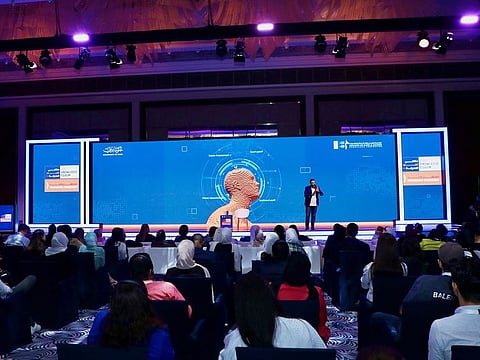Youth Knowledge Forum in Dubai discusses UN’s role in supporting and protecting youth
Role of international awards in empowering youth explored at MBRU-UNDP event’s Day 2

Dubai: The Youth Knowledge Forum held several sessions on its second day that were centred on the UN’s worldwide role in supporting and safeguarding the youth.
A discussion on advanced mentality and a youth entrepreneurship debate was also part of the day’s events.
The first session of the second day focused on the importance of the Global Knowledge Index 2022, role of Mohammed Bin Rashid Foundation (MBRF) in spreading knowledge, and the importance of the partnership between MBRF and United Nations Development Programme (UNDP) in supporting knowledge and development in the Arab states, the region and the world.
Jamal bin Huwaireb, CEO of MBRF; Khaled Abdel Shafi, Regional Hub manager, UNDP; and Dr. Hany Torky, chief technical adviser and project manager, UNDP, participated in the session.
The second session was titled ‘The UN: Unified with the Youth’, which saw the participation of Dr. Dina Assaf, United Nations Resident Coordinator for the UAE.
The session covered the role of the UN in supporting and safeguarding the youth around the world, the significant contribution of youth volunteers to the UN, the positive force of the youth in accelerating development when given the right opportunities and knowledge, and the significance of young people in achieving the Sustainable Development Goals by 2030.
According to Dr. Dina Assaf, the UN is actively making efforts to safeguard and support the youth and addresses their needs and aspirations by enhancing their involvement in the decision-making process. She further said that the youth play a significant role around the world and will make important contributions to establishing societies and pursuing the development route.
Assaf emphasised that the key principles of Sustainable Development Goals (SDGs) 2030 are to ensure that none is left behind in the efforts for achieving the SDGs, and that every youth is taken in to consideration in achieving each of the goals, as they are the leaders of change, and will further utilise their capabilities and energies to ensure a prosperous future for the coming generations.
2030 flag bearers
Assaf also highlighted that the youth are the key players in putting the sustainable development agenda’s policies and procedures into practise and are considered as the “2030 Flag Bearers.” She further stated that the youth have been actively involved in establishing frameworks and procedures that would enable the 2030 plan’s implementation, monitoring, and evaluation. Assaf also emphasised the youth have always been a top priority in the activities and initiatives that support the 2030 plan.
Nikolaus Turner, managing director, Foundation Lindau Nobel Laureate Meetings, participated in the third session, ‘International awards’ role in motivating and empowering youth.’ The discussions centred on Lindau’s role in attracting scientists, youth, and researchers with advanced skills, as well as how international awards contribute to creating radical solutions to global problems.
Turner highlighted that the Lindau Meetings assemble large number of young scientists engaged in addressing the issue of climate change and offer a variety of arguments and suggestions for mitigating this issue. He stressed that the youth are interested in science and knowledge as it is different and distinctive, and he emphasised that the international community can effectively contribute to the development of comprehensive solutions to global issues by encouraging scientists and researchers to offer scientific solutions to the most urgent challenges that people face on a daily basis all over the world.
Turner further stated that patience is the key factor to achieve success, and the most significant example of this is the late Dr. Ahmed Zewail, who won the Nobel Prize in chemistry in 1999. Turner also underlined the need to constantly work to bring together young people and Nobel laureates in order to inspire them, establish a channel of communication between generations, and even forge personal or scientific ties.
Growth mindset
The fifth session titled ‘Growth Mindset,’ featured the Life Scientist, Dr. Khaled Ghattass. The discussion included a variety of subjects, such as the difference between uniqueness and self-esteem and humility, though all are main skills for learning, along with the need to maintain balance between content and communication, and the urge of our youth to have a purpose rather than a goal.
Dr. Ghattas highlighted that confidence and humility are some of the key features of advanced mentality and to understand life and truly cope with reality, a person must not exaggerate in anything, and most importantly humility is the first step on the path to science. He added that creativity requires genuine humility and being truly open, humble, and accepting of others and their differences is the starting point in life. He emphasised that in order to overcome the obstacles that can stand in way and hinder development, the youth must learn effective planning, communication, and goal-balancing abilities.
Debate on entrepreneurship
Two teams participated in a youth debate on entrepreneurship on the second day of the Forum. Elyazia AlSuwaidi, Alia Al Saadi, Fatima Saif, and Omar Al Tahri were on the supporting team, and Salma Yousuf, Iman Hamad, Ghayah Al Harmoudi, and Khamis Ali Al Shehhi featured in the opposing team. Shaima Al Dhanhani, Asma Al Balushi, and Mariam Al Maftoul attended the debate as judges.
The Youth Knowledge Forum was held in the presence and under the patronage of Sheikha Latifa bint Mohammed bin Rashid Al Maktoum, Chairperson of Dubai Culture and Arts Authority (Dubai Culture) and Member of the Dubai Council and was organised by MBRF in collaboration with UNDP. The forum concluded its physical events, which were held on December 6 and 7and now will continue virtually on December 8 and 9 to expand participation from across the globe.



